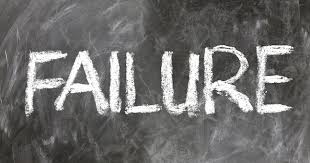As much as we want to, and should, focus on our sales successes, a large part of sales has to do with failure. We win some, we will always lose some. We try a certain approach, say a prospecting program, or a new sales initiative, or a deal strategy.
In the “old days,” we used to do win/loss reviews. They don’t really seem to be part of the vocabulary of most sales managers. Most sales people don’t seem to take the time to reflect on failures to learn from them.
It seems the only time we look at our failures, is when we have failed massively, and often, it’s the “new management team,” assessing the strategies and performance of their predecessors.
Some have argued we should focus more on our successes. I’ve seen some pundits argue we should focus on win reviews, learning what works and drives success, and figuring out how to do more of those things that cause us to succeed.
There is merit to this point of view, but inevitably, focusing only on this will prevent us from growing as we might, we only succeed in growing with the market. We only get our fair share.
There is great risk, however, to this point of view. Focusing on what we’ve always done to be successful, fails to acknowledge how things are changing. How our customers are changing, how are competition is changing, how our markets are changing. Focusing on our success limits us to looking at the way things were, not the way things are currently or where they are going.
I’m an unabashed competitor. I believe it is our “God given right to 100% share of customer and share of market.” It’s our job to figure out how we do this! (OK, I can already hear the shrieks and accusations of arrogance and so forth. In truth, we can never achieve this, but the mindset changes our approach to things.)
To do this, to grow our share, to grow faster than the market, we have to learn from our failures. We have to ask ourselves tough questions. Too often, when we do this, we focus on, “what went wrong, who do we blame?” Instead, we need to start asking ourselves, “What’s changed with our customers, markets, our competition? Where are they going? What should we do differently?”
Failing to learn and change from our failure condemns us to only one thing, continued and increasing failure.
Afterword: There is another school of thought on failure, deriving from the Agile/Lean/Startup world, which is fail fast, fail often (I’m overstating slightly). This is a great article on that perspective. The conclusion is similar, what do we learn from our failures: We Need To Stop Glorifying Failure. Thanks to Hank Barnes for calling this to my attention.

Leave a Reply